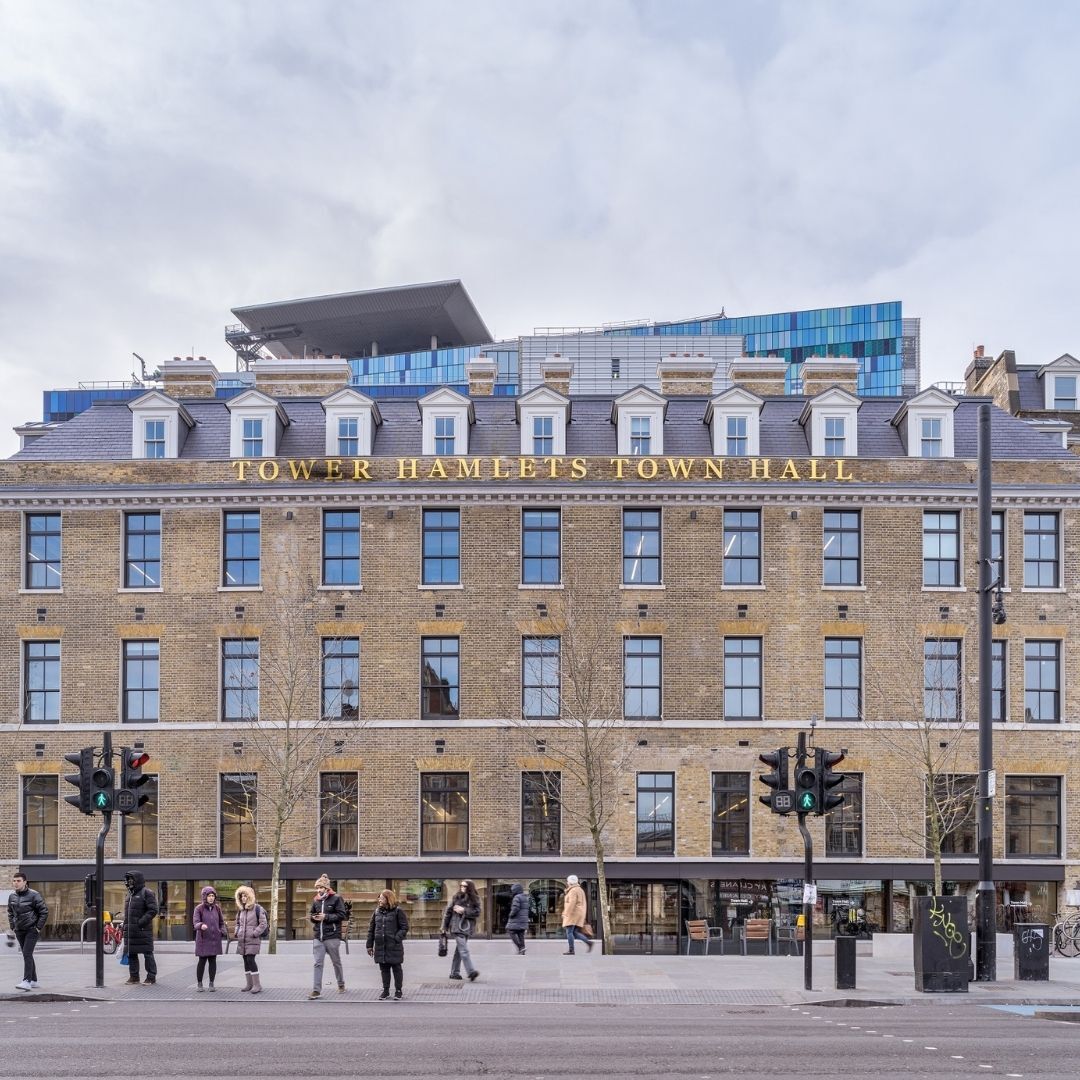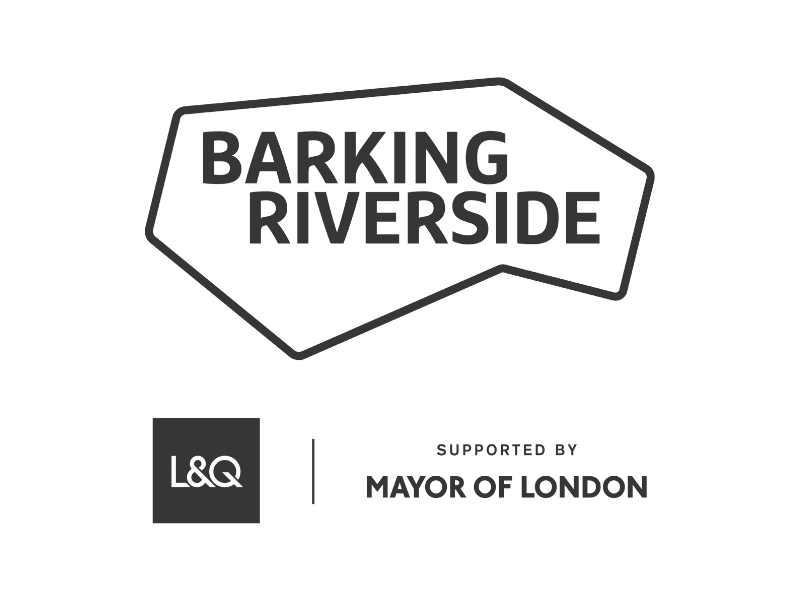Project showcase
Tower Hamlets Town Hall, London Borough of Tower Hamlets, for London Borough of Tower Hamlets with Allford Hall Monaghan Morris, Richard Griffiths, Elliott Wood, Atelier 10 and Bouygues UK

The Georgian external facades of the Grade-II listed former Royal London Hospital are a Whitechapel High Street landmark. The retrofit has created a home for Tower Hamlets Town Hall within its 2.6ha site. The £125m development includes a new build extension that provides six floors of open plan, flexible office space for 2,470 council staff plus partner organisations, a new council chamber and associated meeting facilities.
Who is on the project team? (designer, consultants, etc)
Client: London Borough of Tower Hamlets
Architect: Allford Hall Monaghan Morris
Heritage Consultant: Richard Griffiths Architects
CDM Coordinator: Allford Hall Monaghan Morris
Project Management Peter Marsh Consulting/Turner and Townsend
Structural/Civil Engineer: Elliott Wood
Cost Consultant: Exigere/Turner and Townsend
MEP/Lift Engineer: Atelier 10
Planning Consultant: Gerald Eve
Fire Engineer: Atelier 10
Landscape Architect (Concept): KLA - Kinnear Landscape Architects
Landscape Architect (Delivery): Levitt Bernstein
Transport Consultant: TPP - Transport Planning Practice
Acoustic Consultant: Gillieron Scott Acoustics
Environmental Consultant: Atelier 10
Describe the context of this project, its neighbourhood and people.
The new Town Hall is located within the Grade II listed former Royal London Hospital, in the heart of Whitechapel. This was one of the first purpose-built hospitals in London dating from 1757 and was in use until the NHS moved to a new building at the rear of the site, in 2013. The existing building therefore has a strong social and civic resonance within the community, given that many residents will have visited the building over the years. The building’s history is also linked to Joseph Merrick, known as the Elephant Man, and nurse Edith Cavell. The site was purchased by the council in 2015 and lies at the heart of the Whitechapel Vision masterplan. The masterplan continues to guide regeneration in Whitechapel and includes a ‘green spine’ which connects through the site. A new public square between the Town Hall and hospital building was bought forward as part of the project to provide much needed external amenity and greening for local residents, hospital patients, visitors and council staff. The brief for the new town hall was to create a well-designed accessible environment for public engagement together with a flexible working environment for 2,470 staff. Space for the Council’s democratic functions, including a new council chamber, was also required. A Resident’s Hub where council services could be accessed by the public and a significant area of space for culture and education was at the heart of the brief.
How does this project make use of an existing structure, place or building in a creative way? Is it innovative? How will this project continue to evolve or enable future flexibility and adaptation? Have you considered its resilience?
Rescuing a dilapidated Grade II listed building came with many unknowns and surprises along the way. However, through the careful renovation and reinvention of the building its life has been extended to serve the residents of Tower Hamlets for the next 50-100 years. Reusing and adapting a historic existing structure has created a series of genuinely unique spaces which celebrate the buildings history. The new public entrance at the base of the Grocers Wing, achieved using the Pynford Stool system of underpinning creates a dramatic glazed shop front onto Whitechapel Road. The top lit atrium separates new and old with dramatic bridges linking the new open plan office spaces to the listed 1906 staircases. Former operating theatres are re-purposed as quirky break-out and workspaces. The new build extension was designed with a long-life loose fit mandate, ensuring flexibility in the design of the layouts and servicing to accommodate the changing needs of the council in the future. The upper two floors of open plan office space have been designed to be sub-let to partner organisations allowing the council to generate additional revenue. Future flexibility has also been built-in at ground floor with the local presence space able to accommodate a variety of different rolling activities for the community including exhibitions, summer schools and seminars. Equally the flat floor council chamber can be reconfigured to host a range of events from full-council meetings to seminars and training sessions.
What is the environmental impact of the project? How will the carbon use and material impact of the development be mitigated? What is the sustainability strategy?
Environmental strategies include thermally upgrading the existing fabric to lower operational carbon, minimising energy costs for the council. Careful selection of materials for the extension include concrete with 50% GGBS content, minimising embodied carbon. As part of a circular approach thousands of bricks were reclaimed as part of the enabling works and these were used for repairs within the retained building. The building servicing is all-electric with on-site renewables contributing to an ‘A’ EPC rating and BREEAM “Excellent”. The new building promotes the health and wellbeing of its users through enhanced fresh air ventilation, generous cycling facilities, and inviting indoor and outdoor spaces. The design and construction of the new Town Hall afforded the client, consultants and contractor the opportunity to engage extensively with the local community, providing 19 local apprenticeships. In total 403 people were engaged in the design and construction of the project from London Borough Tower Hamlets and other growth boroughs. It is estimated that over £6m of goods and services have been purchased from local businesses during construction. Going forward an annual spend of £4.1m within the area is predicted. A clearly defined quantum of social value and community engagement drafted by Tower Hamlets Council was committed to by those submitting at competition stage. AHMM built a strong relationship with the local Swanlea School engaging with pupils at the earliest design stages. Over the past 7 years, pupils have been mentored in design and technology, taken on site visits and attended learning days at AHMM.
Festival of Pineapples
24-26 February 2026
Pineapples prize giving night
April
Pineapples at Festival of Place
10 June 2026
© The Pineapples - Tweak Ltd. 124 City Road, London, EC1V 2NX. Tel: 020 3326 7238





